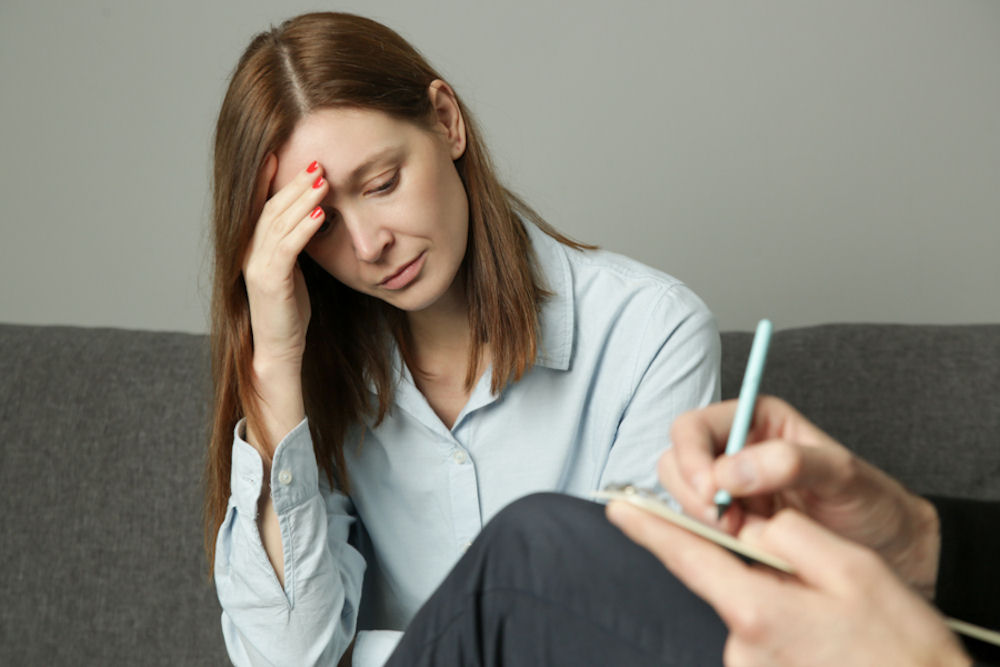Anxiety and depression are two of the most common mental health struggles, but they can feel worlds apart. Anxiety often shows up as a racing mind, constant worry, and a sense of being on edge, like your body is stuck in overdrive. Depression, on the other hand, can feel like a heavy weight that drains your energy and makes even the simplest tasks feel impossible. While they’re different, they can sometimes overlap, leaving you wondering which one you’re dealing with.
Understanding the differences between anxiety and depression is key to finding the right support and tools to feel better. Anxiety might keep you up at night overthinking, while depression could make it hard to get out of bed in the morning. Both can impact your relationships, work, and overall well-being, but they show up in distinct ways. By breaking down what sets them apart, you can start to make sense of what you’re feeling and take steps toward healing.
What Is Depression?
Depression is a mental health condition that goes beyond occasional sadness. It’s characterized by persistent melancholy, a sense of hopelessness, and no interest in hobbies you once enjoyed. This mood disorder can significantly affect one’s thoughts, emotions, and daily functioning.
What Are The Symptoms Of Depression?
- Feeling Down All the Time. It’s a constant sadness or emptiness that doesn’t seem to go away, even when things are going okay.
- Losing Interest in Things You Used to Love. Hobbies, hanging out with friends, or even your favorite shows suddenly feel… meh. It’s like the joy has been sucked out of everything.
- Feeling Exhausted All the Time. Even small tasks, like getting out of bed or brushing your teeth, can feel like climbing a mountain. No matter how much sleep you get, you’re always fatigued.
- Sleeping Too Much or Not Enough. You’re either crashing for 12 hours straight or lying awake at 3 a.m., staring at the ceiling.
- Changes in Appetite or Weight. Some people lose their appetite and forget to eat, while others might crave comfort food nonstop.
- Feeling Worthless or Guilty. You might constantly beat yourself up over things, even stuff that’s not your fault.
- Trouble Concentrating or Making Decisions. Focusing on school, work, or even a conversation can feel impossible.
- Feeling Restless or Slowed Down. Some people feel fidgety and on edge, while others feel like they’re moving through molasses.
- Thoughts of Death or Suicide. If you’re having thoughts like “What’s the point?” or daydreaming about ending your life, reach out for help ASAP.
- Physical Aches and Pains. Depression can also show up as headaches, stomachaches, or just feeling sore all the time for no reason.
What Is Anxiety?
Anxiety is a feeling of worry, fear, or unease that can be intense and persistent and often involves both mental and physical symptoms. While everyone experiences anxiety occasionally, it becomes a concern when these feelings are intense, persistent, and interfere with daily life.
What Are The Symptoms Of Anxiety?
- Racing Thoughts. Your mind may feel cluttered with worries, making it hard to focus or relax.
- Physical Symptoms. Anxiety can cause a fast heartbeat, sweating, shaking, or stomach discomfort.
- You might replay past events or imagine worst-case scenarios repeatedly.
- Anxiety can lead to avoiding situations, people, or places that trigger discomfort.
- Sleep Problems. Falling asleep or staying asleep can be difficult when your mind is busy or restless.
- Feeling On Edge. You may feel constantly alert, as if something bad is about to happen.
- Anxiety can make you feel easily frustrated or short-tempered.
- You might feel the need to over-prepare or avoid mistakes at all costs.
- Muscle Tension. Anxiety can cause tightness in your muscles, like clenched jaws or stiff shoulders.
- Fear of Judgment. In social situations, you may worry excessively about being judged or embarrassed.
What Are Types Of Anxiety?
Anxiety comes in various forms, each affecting people differently. Here’s a breakdown of some common types:
- Generalized Anxiety Disorder (GAD): Persistent and excessive worry about various aspects of daily life, such as health, work, or social interactions, often anticipating the worst even when there’s little reason for concern.
- Panic Disorder: Characterized by recurrent, unexpected panic attacks, such as sudden periods of intense fear that may include palpitations, sweating, trembling, and feelings of impending doom.
- Social Anxiety Disorder: Intense fear of social situations where you might be judged, making you avoid social interactions out of fear of embarrassment or scrutiny.
- Specific Phobias: Marked fear or anxiety about a specific object or situation, such as heights, animals, or flying, leading to avoidance behavior.
- Agoraphobia: Fear of situations where escape might be difficult, often leading to avoidance of places like open spaces, public transportation, or crowded areas.
- Separation Anxiety Disorder: Excessive fear or anxiety about being separated from those to whom you are attached, often worrying about harm befalling loved ones during periods of separation.
- Selective Mutism: Consistent failure to speak in specific social situations where there’s an expectation to speak, despite speaking in other situations.
What Is The Difference Between Anxiety And Depression?
Understanding the distinctions between anxiety and depression can be challenging, as they often share overlapping symptoms. Below is a breakdown to help show the differences between the two:
- Anxiety: Characterized by excessive worry and fear about future events or potential threats.
- Depression: Marked by a never-ending hopeless feeling, deep sadness, and no care at all for your former hobbies.
- Anxiety: This may include restlessness, rapid heartbeat, muscle tension, and difficulty sleeping.
- Depression: Often presents with fatigue, changes in appetite or weight, and disrupted sleep patterns.
- Anxiety: Involves racing thoughts, constant worry, and overthinking potential negative outcomes.
- Depression: Characterized by negative self-perception, feelings of worthlessness, and difficulty concentrating.
- Anxiety: This can lead to avoidance of situations that trigger worry or fear.
- Depression: This may result in withdrawal from social interactions and a decline in motivation to engage in daily activities.
- Anxiety: Primarily future-focused, with concerns about upcoming events or uncertainties.
- Depression: Often past-focused, with ruminations on past failures or losses.
What Steps Can You Take To Manage Anxiety And Depression?
Managing anxiety and depression involves adopting various strategies that promote mental well-being. Here are some effective steps to consider:
- Engage in Regular Physical Activity: Aim for at least 30 minutes of exercise most days. Activities like walking, jogging, or yoga can boost mood and reduce anxiety.
- Maintain a Balanced Diet: Consume well-balanced meals and limit alcohol and high-sugar, high-fat, processed foods.
- Prioritize Quality Sleep: Establish a consistent sleep routine by going to bed and waking up at the same time each day. Make sure your room is cool, dark, and quiet to help you sleep better.
- Practice Mindfulness and Meditation: Incorporate mindfulness practices or meditation into your daily routine to help manage symptoms of anxiety and depression.
- Connect with Supportive People: Engage in open conversations with friends, family, or support groups to share your experiences and feelings.
- Set Achievable Goals: Break tasks into smaller, manageable steps and celebrate your progress to build confidence and motivation.
- Seek Professional Help: Consult with mental health professionals who can provide tailored therapies and, if necessary, medication to address your specific needs.
How Do Treatment Options Vary Between Anxiety And Depression?
Anxiety and depression, while sharing some similarities, often require distinct treatment approaches tailored to each condition’s unique characteristics. Here’s how treatment options vary between the two:
- Psychotherapy:
- Cognitive Behavioral Therapy (CBT): Focuses on identifying and altering negative thought patterns and behaviors associated with anxiety.
- Medications:
- Selective Serotonin Reuptake Inhibitors (SSRIs): Commonly prescribed to manage anxiety symptoms.
- Benzodiazepines: Used for short-term relief due to potential dependency risks.
- Lifestyle Modifications:
- Regular physical activity, sufficient sleep, and mindfulness practices can help alleviate anxiety symptoms.
- Psychotherapy:
- Various therapeutic approaches, including CBT, are effective in treating depression.
- Medications:
- SSRIs and SNRIs: Commonly prescribed to help manage depressive symptoms.
- Tricyclic Antidepressants: An older class of antidepressants that may be used when other medications are ineffective.
- Brain Stimulation Therapies:
- Electroconvulsive Therapy (ECT): Utilized for severe depression unresponsive to other treatments.
- Transcranial Magnetic Stimulation (TMS): A non-invasive option for treatment-resistant depression.
- Lifestyle Modifications:
- Engaging in regular exercise, maintaining a healthy diet, and ensuring adequate sleep can support overall mental health.
Arkview Recovery Offers Treatment For Anxiety And Depression in PA
Arkview Recovery offers specialized treatment for anxiety and depression, creating a safe and supportive space where healing can begin. Our approach is rooted in evidence-based methods like cognitive-behavioral therapy (CBT) and mindfulness, tailored to address your specific needs. Alongside traditional therapy, we incorporate holistic practices such as yoga, art therapy, and fitness to nurture both mental and physical well-being. With a team of experienced professionals, Arkview focuses on equipping you with practical tools and strategies to manage symptoms and build resilience for the long term.
Beyond personal care, Arkview Recovery emphasizes community and connection. Group therapy and peer support provide opportunities to share experiences and feel less alone in your journey. Our flexible programs are designed to fit your lifestyle, whether you need intensive care or ongoing support. By combining personalized treatment with a compassionate approach, Arkview Recovery helps you find balance, hope, and a path forward. If anxiety or depression feels overwhelming, contact us today as your first step toward reclaiming your life.








